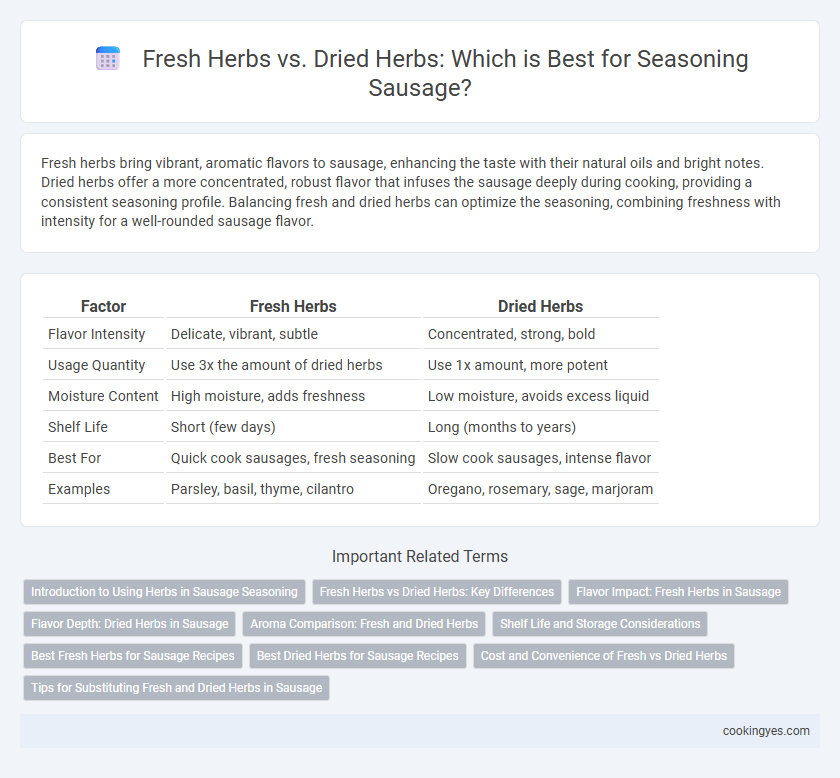Fresh herbs bring vibrant, aromatic flavors to sausage, enhancing the taste with their natural oils and bright notes. Dried herbs offer a more concentrated, robust flavor that infuses the sausage deeply during cooking, providing a consistent seasoning profile. Balancing fresh and dried herbs can optimize the seasoning, combining freshness with intensity for a well-rounded sausage flavor.
Table of Comparison
| Factor | Fresh Herbs | Dried Herbs |
|---|---|---|
| Flavor Intensity | Delicate, vibrant, subtle | Concentrated, strong, bold |
| Usage Quantity | Use 3x the amount of dried herbs | Use 1x amount, more potent |
| Moisture Content | High moisture, adds freshness | Low moisture, avoids excess liquid |
| Shelf Life | Short (few days) | Long (months to years) |
| Best For | Quick cook sausages, fresh seasoning | Slow cook sausages, intense flavor |
| Examples | Parsley, basil, thyme, cilantro | Oregano, rosemary, sage, marjoram |
Introduction to Using Herbs in Sausage Seasoning
Fresh herbs provide a vibrant, aromatic flavor that enhances sausage's natural taste, while dried herbs offer a more concentrated and longer-lasting seasoning. Using fresh herbs like parsley, thyme, and sage adds moisture and subtle complexity, whereas dried herbs intensify the flavor profile and blend evenly throughout the meat. Balancing fresh and dried herbs in sausage seasoning enables a rich, layered taste that highlights the meat's character and complements other spices.
Fresh Herbs vs Dried Herbs: Key Differences
Fresh herbs provide a vibrant, intense flavor with a higher moisture content that enhances the juiciness of sausage, while dried herbs offer a concentrated, potent taste ideal for long cooking times. Fresh herbs such as parsley, thyme, and rosemary release essential oils that blend seamlessly into sausage mixtures, whereas dried herbs like oregano and sage maintain their potency and shelf life, delivering a more robust and slightly earthy flavor. Choosing between fresh and dried herbs depends on the sausage recipe's cooking duration and desired flavor intensity, with fresh herbs best for quick-cooked sausages and dried herbs for slow-cooked varieties.
Flavor Impact: Fresh Herbs in Sausage
Fresh herbs deliver a vibrant and intense flavor to sausage, significantly enhancing its aroma and complexity compared to dried herbs. The essential oils in fresh herbs, such as parsley, thyme, and rosemary, retain more potency, providing a fresher, brighter taste profile that complements the richness of the meat. Using fresh herbs in sausage seasoning results in a more pronounced herbal note, elevating the overall sensory experience of the dish.
Flavor Depth: Dried Herbs in Sausage
Dried herbs deliver a concentrated and robust flavor profile that enhances the savory depth of sausage, allowing for more intense seasoning compared to fresh herbs. Their long shelf life and concentrated oils release flavor slowly during cooking, infusing the sausage with consistent aromatic notes. Using dried herbs such as oregano, thyme, or rosemary provides a well-rounded seasoning that complements sausage meat without overpowering its natural taste.
Aroma Comparison: Fresh and Dried Herbs
Fresh herbs deliver a vibrant, intense aroma that enhances sausage's flavor profile with bright, green notes and natural oils, heightening sensory appeal. Dried herbs provide a more concentrated, earthy scent due to moisture loss but often lack the lively fragrance of fresh counterparts. Using fresh herbs ensures a dynamic aroma in sausage seasoning, while dried herbs contribute a robust, enduring fragrance suitable for slow-cooked varieties.
Shelf Life and Storage Considerations
Fresh herbs offer vibrant flavor but have a short shelf life of about 1 to 2 weeks when stored in the refrigerator, requiring careful moisture control to prevent spoilage. Dried herbs, with a shelf life of up to 1 to 3 years when stored in airtight containers away from light and heat, provide a more concentrated flavor ideal for long-term storage. Choosing between fresh and dried herbs for seasoning sausage depends on balancing flavor intensity with storage convenience and longevity.
Best Fresh Herbs for Sausage Recipes
Fresh herbs like parsley, sage, rosemary, and thyme deliver vibrant flavors and aromatic depth that elevate sausage recipes. These herbs retain essential oils better than dried versions, providing a fresher, more pronounced taste profile. Using fresh herbs enhances moisture and texture in sausages, contributing to a well-balanced and savory seasoning blend.
Best Dried Herbs for Sausage Recipes
Dried herbs such as thyme, oregano, and sage are among the best choices for seasoning sausage recipes due to their concentrated flavor and long shelf life. Rosemary and fennel seeds also enhance the savory profile of sausages, providing a robust and aromatic seasoning. These dried herbs maintain their potency through the cooking process, ensuring consistent flavor in each batch.
Cost and Convenience of Fresh vs Dried Herbs
Fresh herbs offer vibrant flavor and aroma but generally come at a higher cost and have a shorter shelf life, requiring frequent purchases that can increase overall seasoning expenses for sausage. Dried herbs are more affordable and have a longer storage time, providing convenience and consistent availability, which makes them ideal for bulk sausage production or infrequent seasoning needs. Balancing cost and convenience, many sausage makers opt for dried herbs for everyday use while reserving fresh herbs for special batches or when superior flavor is desired.
Tips for Substituting Fresh and Dried Herbs in Sausage
Fresh herbs such as parsley, thyme, and rosemary provide vibrant, bright flavors that enhance sausage seasoning but often require a larger quantity compared to dried herbs, as drying concentrates their flavor. When substituting dried herbs for fresh in sausage recipes, use about one-third the amount because dried herbs have a more intense flavor due to moisture removal. To maintain optimal seasoning balance, add fresh herbs towards the end of cooking to preserve their aroma, while dried herbs benefit from longer cooking times to fully release their flavor into the sausage mixture.
Fresh herbs vs dried herbs for seasoning sausage Infographic

 cookingyes.com
cookingyes.com